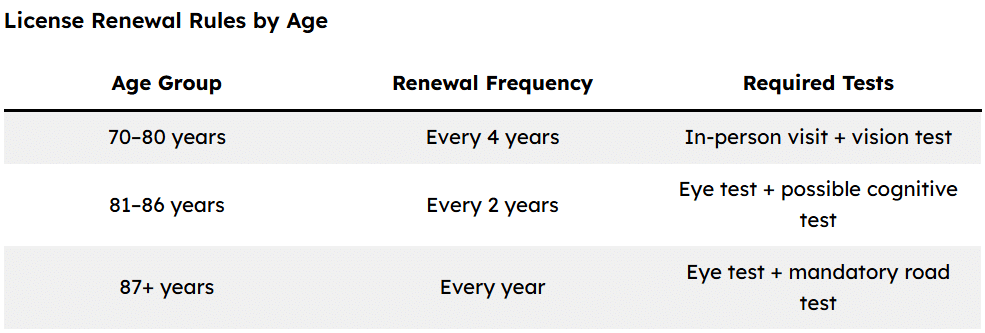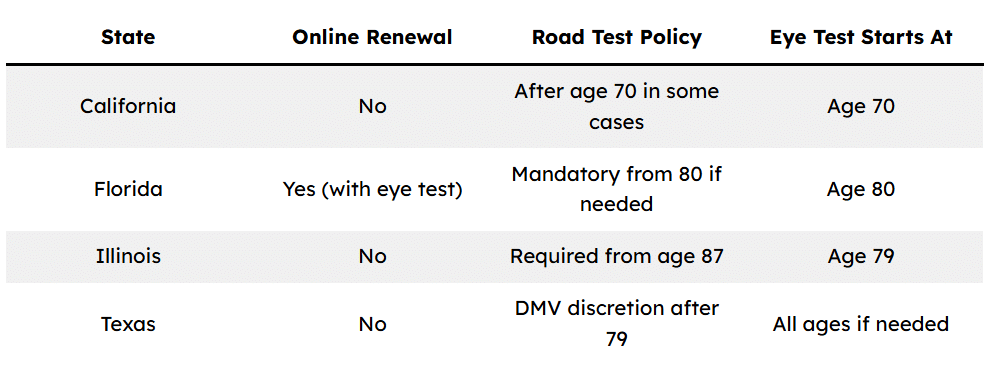Starting in July 2025, the U.S. Department of Transportation will roll out a new law focused on senior drivers. With the number of older adults on the road rising, the goal is to keep roads safe while helping drivers aged 70 and up maintain their independence. As the senior population expands, the challenge is to balance age-related physical and cognitive changes with the importance of keeping seniors mobile and self-reliant.
The law aims to tackle age-related driving risks like slower reflexes, reduced vision, and cognitive decline. At the same time, it protects the right of older Americans to keep driving if they can do so safely. The new rule includes more frequent license renewals and specialized tests designed to meet the needs of senior drivers.
New License Renewal Schedules Based on Age
Under the new rule, the process for renewing driving licenses will differ based on the driver’s age. Seniors aged 70 to 80 will be required to renew their licenses every four years, with an in-person visit and a vision test. Those aged 81 to 86 will need to renew every two years and must undergo both an eye test and a possible cognitive assessment. For drivers aged 87 and older, the law mandates an annual road test to ensure they can still drive safely.
The change is meant to offer a fair, personalized approach for senior drivers, moving away from a one-size-fits-all renewal system. It ensures each driver is evaluated based on their current abilities rather than their age alone.

Mandatory Vision and Cognitive Tests
To boost road safety, seniors will need to take a vision test at every license renewal. These exams are designed to spot common eye issues like cataracts or glaucoma that can impact clear vision. If a driver wears corrective lenses, the test will be done while they’re wearing their glasses or contacts.
A cognitive test may also be required if a doctor or the DMV notices signs of memory loss, confusion, or other cognitive issues. Conditions like early-stage Alzheimer’s or the effects of a stroke could trigger this evaluation. These measures help determine whether a senior can make safe driving decisions, ultimately aiming to lower the risk of accidents.
Road Test Requirements for Drivers Aged 87 and Above
Beginning at age 87, seniors must take a road test every year. This required behind-the-wheel exam helps confirm that older drivers can still operate a vehicle safely and respond effectively in different traffic scenarios. Even seniors who feel confident and healthy will need to show their driving skills in person.
The yearly road test acts as a proactive step to evaluate driving ability and reduce accidents linked to slower reaction times and aging reflexes. While the test might feel intimidating, it’s meant to support safety while allowing seniors to keep their independence behind the wheel.

State-Specific Differences in Implementation
Although this new federal rule applies nationwide, states have the flexibility to tailor it to their local needs. In California, for instance, road tests may not be required for drivers under 70, though some may face testing after that age. Florida begins mandatory road tests at 80, while Illinois starts at 79.
Because of these differences, seniors will need to stay informed about the specific rules in their state. Local DMVs will offer clear guidance on when and how to renew a license, making sure each state upholds the core goals of the law while addressing regional needs.
Preparation Steps for Seniors
With the new rules set to take effect in July 2025, it is essential for seniors to begin preparing for the changes well in advance. Seniors should have their vision checked at least 90 days before their renewal date to ensure they meet the vision requirements. It’s also important to gather relevant medical records, including any clearance from healthcare providers, such as neurologists or cardiologists.
Additionally, seniors may want to consider taking a defensive driving course, which could not only refresh their driving skills but may also allow them to bypass the road test in some states. Regularly checking the DMV’s website for updates and specific state requirements will ensure that seniors stay informed as the law’s implementation approaches.

